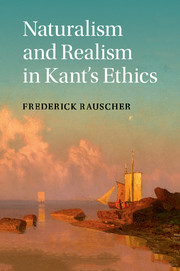Book contents
- Naturalism and Realism in Kant’s Ethics
- Naturalism and Realism in Kant’s Ethics
- Copyright page
- Contents
- Book part
- Citations of Kant’s writings
- Introduction
- Part I Laying the ground
- Part II Practical reason in nature
- 3 The priority of the practical and the fact of reason
- 4 The transcendental status of empirical reason
- Part III Morality beyond nature?
- Works cited
- Index
3 - The priority of the practical and the fact of reason
from Part II - Practical reason in nature
Published online by Cambridge University Press: 05 December 2015
- Naturalism and Realism in Kant’s Ethics
- Naturalism and Realism in Kant’s Ethics
- Copyright page
- Contents
- Book part
- Citations of Kant’s writings
- Introduction
- Part I Laying the ground
- Part II Practical reason in nature
- 3 The priority of the practical and the fact of reason
- 4 The transcendental status of empirical reason
- Part III Morality beyond nature?
- Works cited
- Index
Summary
- Type
- Chapter
- Information
- Naturalism and Realism in Kant's Ethics , pp. 81 - 106Publisher: Cambridge University PressPrint publication year: 2015

